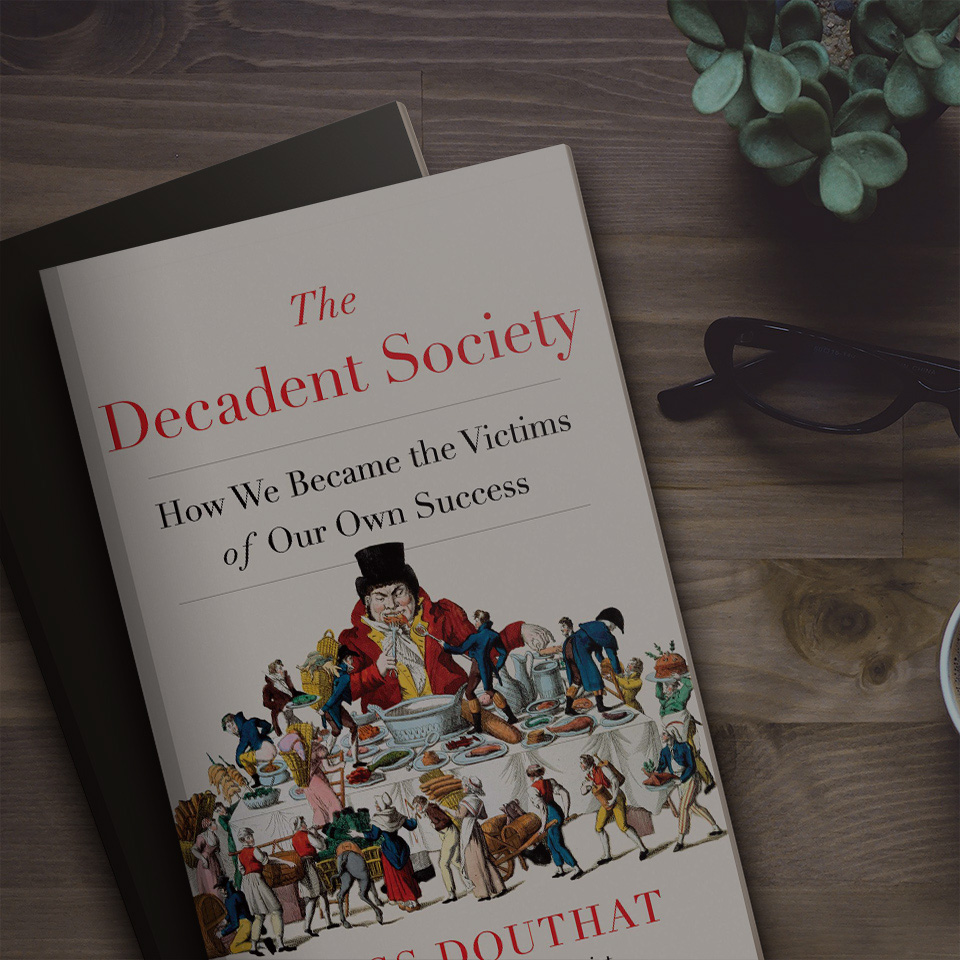In Oscar Wilde’s play Lady Windermere’s Fan, Lord Darlington memorably quips, “We are all in the gutter, but some of us are looking at the stars.”
Wilde’s contemporary, H.G. Wells, along with the earlier French author Jules Verne, created a genre to satisfy our longing to look up as the world modernized. The same fascination with the heavens that framed the reality of the Psalmist, Origen, Dante, and Galileo became secularized, but was no less mysterious as the twentieth century dawned. In one way or another, looking up has always characterized the human condition. That is, perhaps, until recently.
In his new book, The Decadent Society: How We Became the Victims of Our Own Success, New York Times columnist Ross Douthat describes how we may have lost our longing both for heavenly contemplation and exploration. In prosperous places like the United States and Europe, we have settled into what the late French historian Jacques Barzun calls “decadence,” a kind of cultural wheel-spinning. We don’t think we’re in the gutter, and we don’t know where to cast our gaze. Douthat identifies the moment everything changed as the short-lived space race, the era when many people thought we were just beginning to realize the wildest dreams of Verne and Wells. Douthat writes:
It is not a coincidence that the end of the space age has coincided with a turning inward in the developed world, a crisis of confidence and an ebb of optimism and a loss of faith in institutions, a shift toward therapeutic philosophies and technologies of simulation, an abandonment of both ideological ambition and religious hope.
The Decadent Society is neither inflammatory nor despairing; and it is compelling, but not flawless. While Douthat’s analysis of popular culture and religion here is of the same high value that we have come to expect from his newspaper columns and earlier books, the evangelistically minded reader may also find it incomplete.
A prime example is Douthat’s prognosis for cinema. Douthat writes, “A society that generates a lot of bad movies need not be decadent; a society that just makes the same movies over and over again might be.” The “fan service” characteristic of the recent Star Wars films from the new Disney era is understandably the largest target in Douthat’s crosshairs. Much popular religion is the same: an easy, unsatisfying pastiche. I found myself nodding along in agreement.
But then it occurred to me that Douthat was giving up too easily. For example, the almost two dozen Avengers movies melt together as one big mess in my mind. They make big bucks, but they are not built to last. It is reasonable to assume that even in ten years—let alone a hundred—they will be largely forgotten, even though they are the film industry right now.
Maybe in a generation or two, no one will be watching anything by J. J. Abrams, but everyone will agree that Terence Malick is a genius. Maybe poets like Dana Gioia and James Matthew Wilson will be remembered, and the bestselling authors forgotten. Likewise with Christianity. The individualized therapeutic philosophies come and go—and in a decadent time, they may come in greater abundance—but Our Lord, in his Church, will really be with us “to the close of the age” (Matt. 28:20). Plenty of Catholics are still going to Mass, and newcomers are still entering the Church, despite the spirit of the age. Douthat reads the signs of the times well; but as Gandalf says, “even the very wise cannot see all ends.”
Douthat is right on target in the final third of The Decadent Society, however, with some big-picture theories about a flourishing future. Here we get a good dose of hope as a payoff for Douthat’s mostly accurate, but somewhat depressing, insights from earlier on. Cardinal Robert Sarah of Guinea emerges for Douthat as a standard-bearer for nondecadent stargazing—a faithful recapturing of the Western ambition and imagination led by someone born outside of it. Reflecting on a powerful recent speech Sarah gave in France, Douthat notes,
[Sarah] envisioned the links between north and south neither as a threat to the north, nor as a chance to simply remake the south in the north’s image—but as an opportunity for entirely new, pan-racial configurations that would reach back into Europe’s past to reshape both the continents’ third-millennium future.
Douthat concludes The Decadent Society with faithful, but tongue-in-cheeek, anticipation:
I’m just saying that if this were the age in which some major divine intervention happened, whether long prophesied or completely unforeseen, there would be, in hindsight, a case that we should have seen it coming. And it shouldn’t surprise anyone if decadence ends with people looking heavenward: toward God, toward the stars, or both.
It is on that “heavenward” glance that the evangelist pounces.
As St. Augustine, an African of the decadent late Roman Empire, wrote in City of God: “By humility we reach a height—a height not grasped by human arrogance but granted by divine grace—which transcends all these earthly pinnacles that totter with the shifts of time.”
Or as Douthat puts it in his final sentence: “Down on your knees—and start working on the warp drive.”
